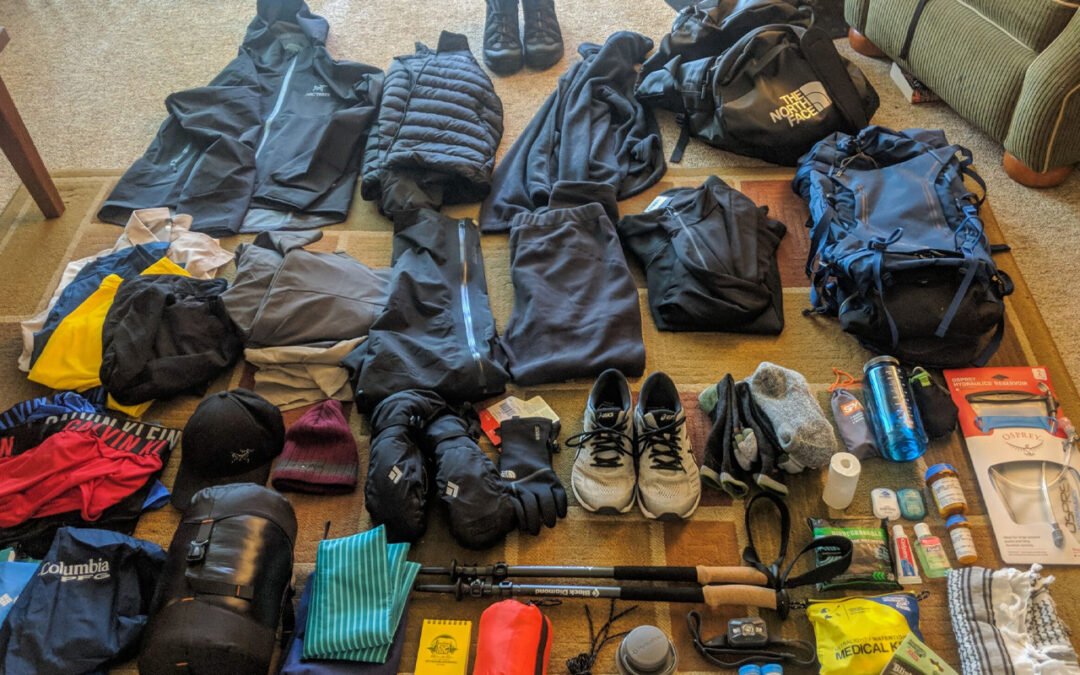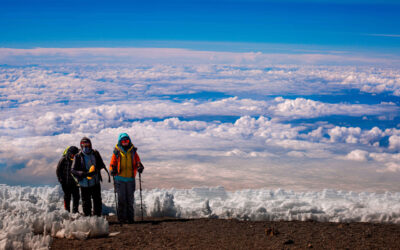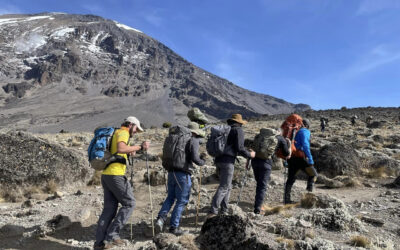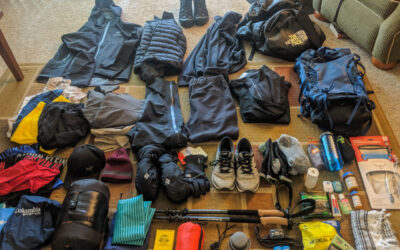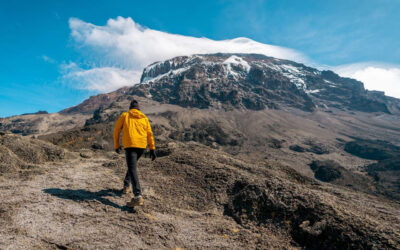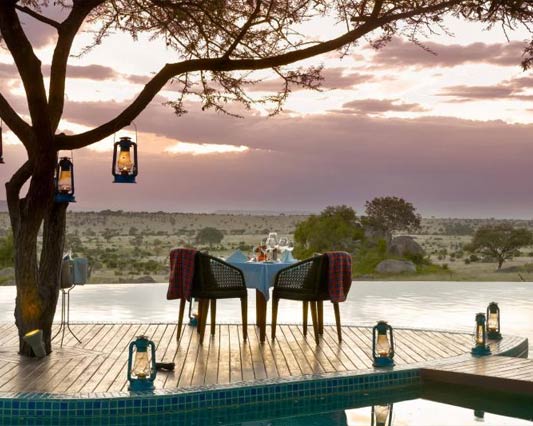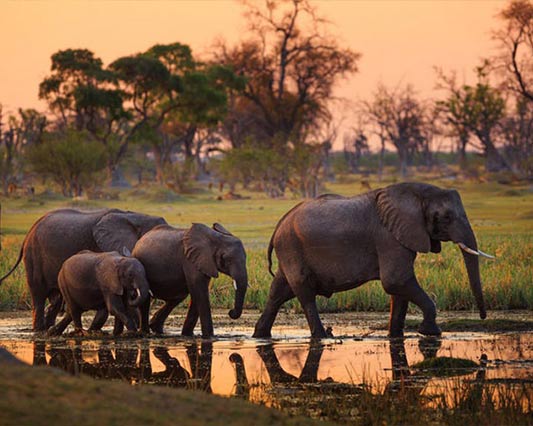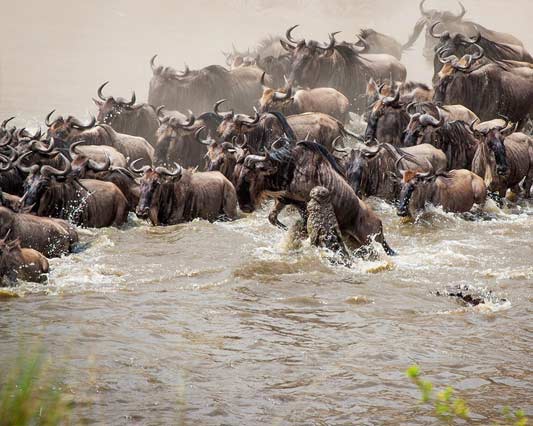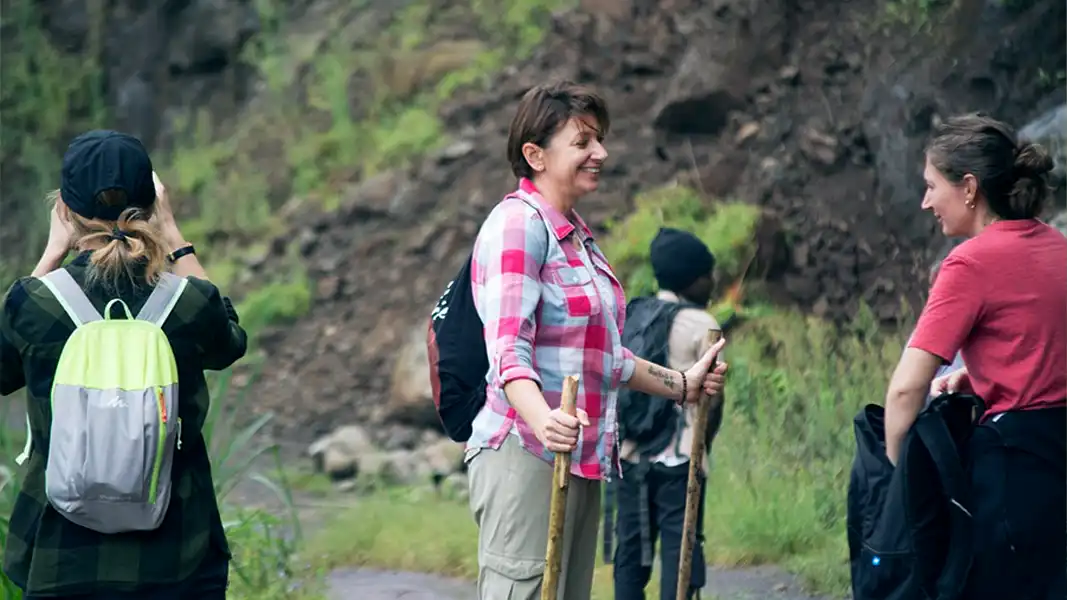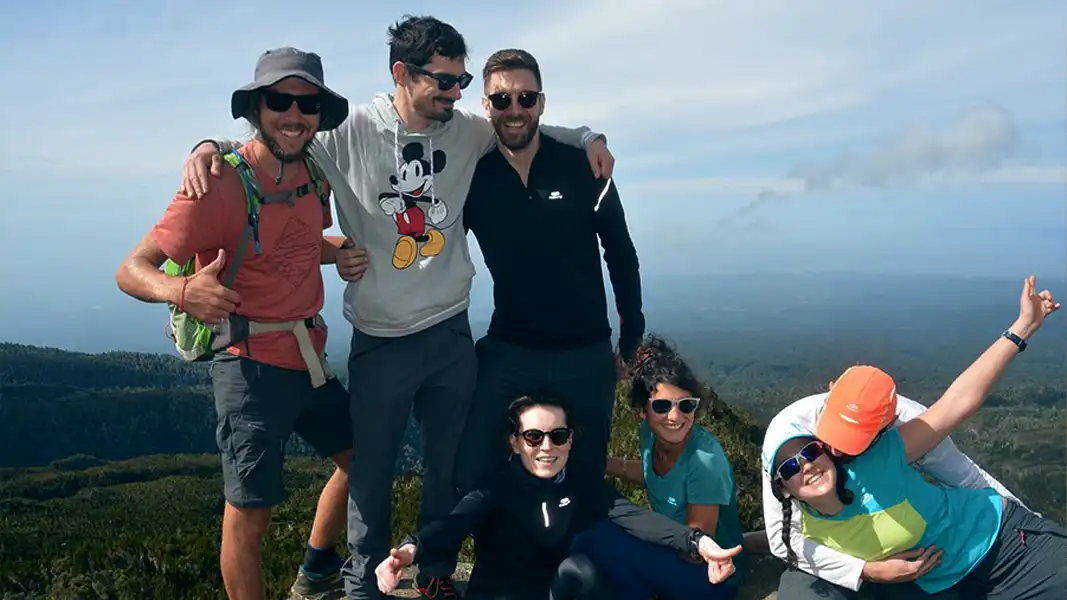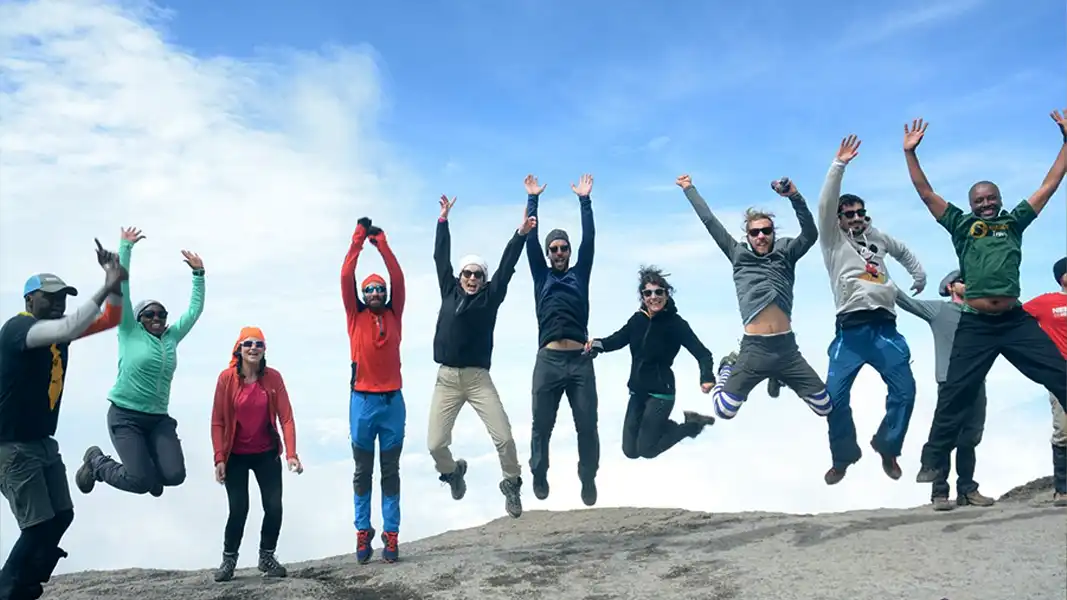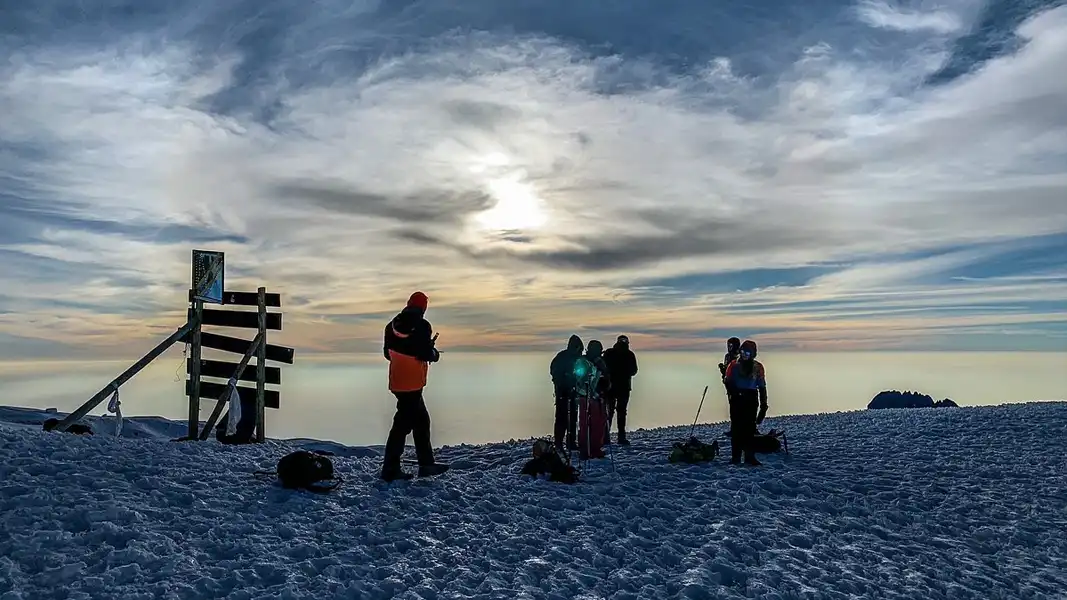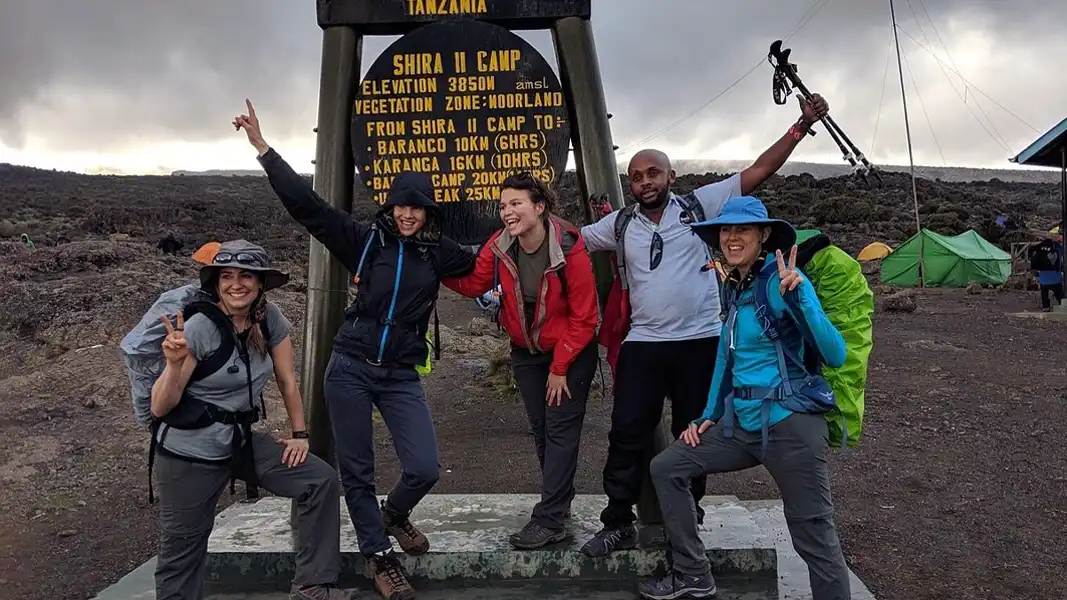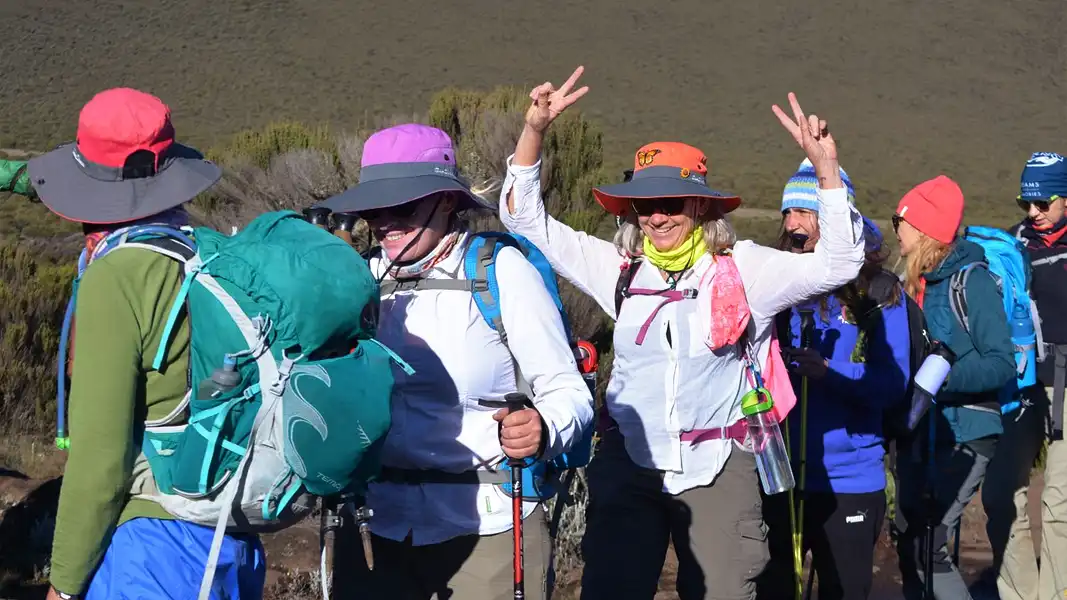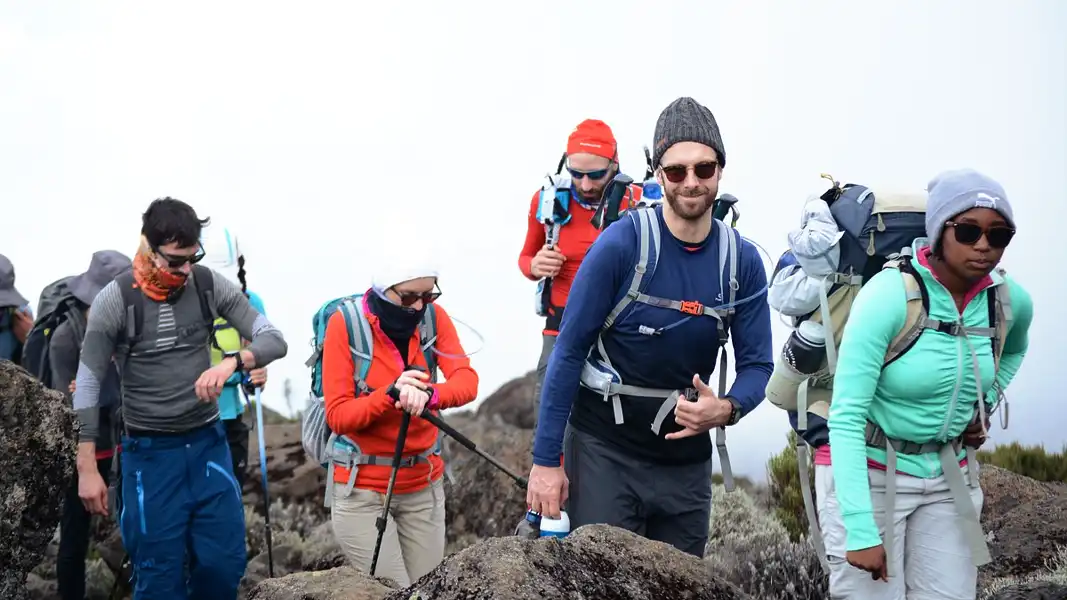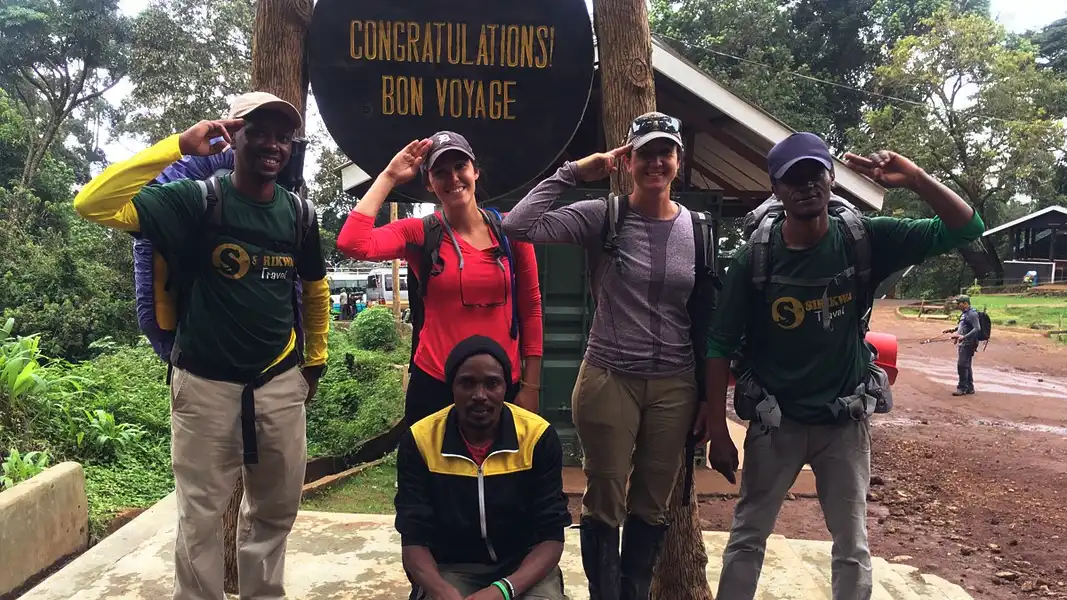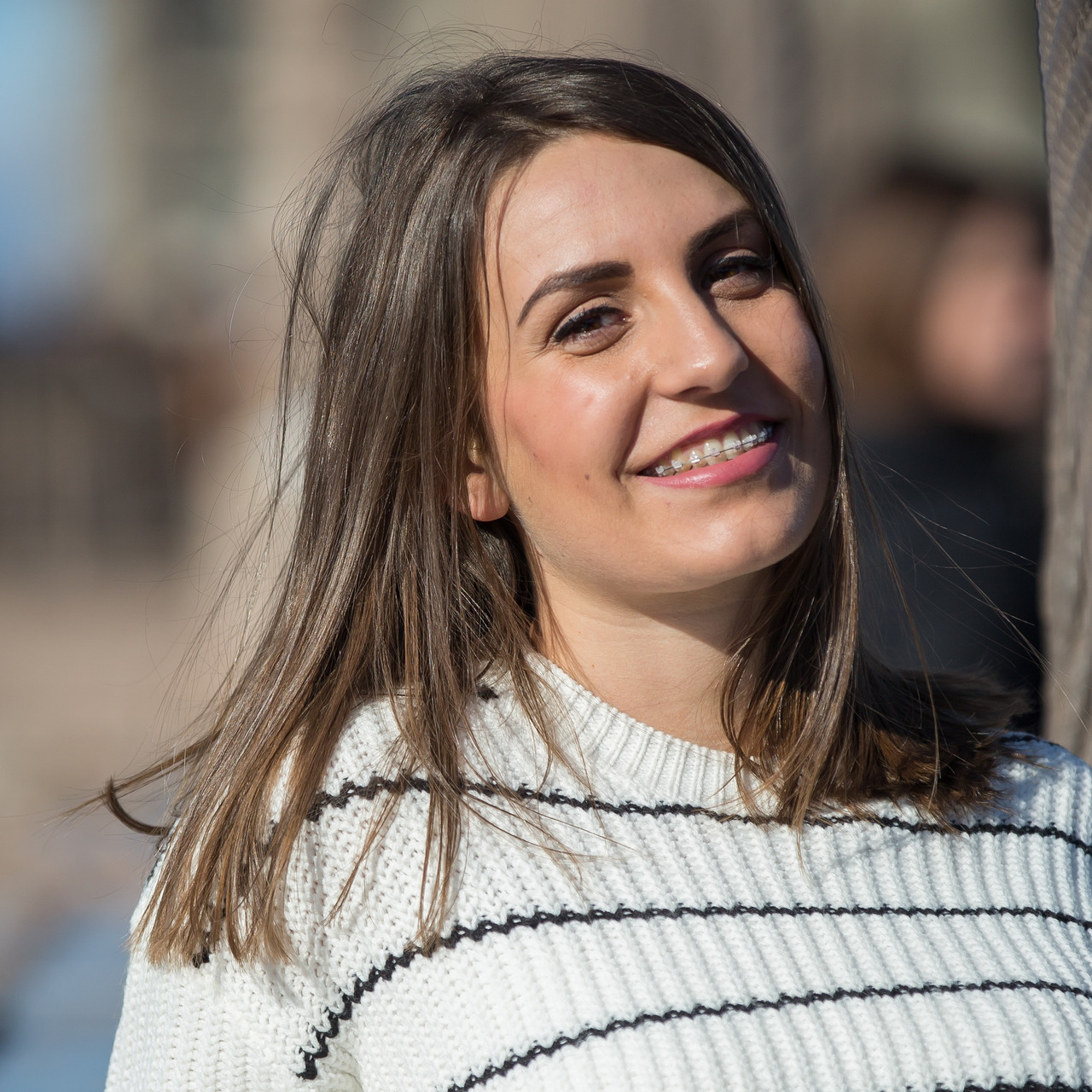If you’re looking for a reliable packing list for your climb up Mount Kilimanjaro, you’ve landed in the right place. Our comprehensive list will help you be the best type of climber, prepared with the right balance of essentials while maintaining a manageable bag weight. Here’s the only Kilimanjaro packing list you’ll need to look at in the run-up to your expedition.
| Bags | Sleeping Equipment | Clothing | Footwear | Headgear / Eyewear | Personal Hygiene |
| Repair Kits | Cameras / Tech | First Aid | Miscellaneous | Documents | Buying vs. Renting |
Bags
Organised trips like our supported Kilimanjaro climbs come with a large team of people including guides and cooks, and porters to carry your main bag as well as tents, kitchen equipment, food, fuel, tables and chairs. While this makes it easier for you to conserve energy and focus on reaching the summit successfully, it does mean that there is a weight limit to stick to. It’s also important to be very aware of the welfare of porters during your climb, so not over-packing is key.
| Main rucksack or duffle bag (70 litres) | Porters are not allowed to carry more than 20kg in total and this allowance needs to include space for their own belongings. So make sure your bag does not exceed the weight of 15kg. The Chagga porters carry bags on their heads, so no hard cases please. We rent out the Highlander Lomond Bag which you can pick up in Moshi when you arrive. Note that these bags will go into another large sack which the porters carry, in order to protect your bag further from the elements |
| Day pack (30-40 litres) | This is the bag you will carry every day on your back, so make sure it has room for essentials such as water bottles, spare layers and waterproofs, camera etc. We rent out the Vorlich 40L day pack which has its own rain cover and is perfect for a trip like this. |
| Dry bags / tough poly bags | Make sure all your contents are wrapped in waterproof bags to keep them dry. Use them also to store used clothes during the trek. We have various sizes for rent. |
| Waterproof bag covers | We will put your main bag into additional waterproof sacks in case of rain but make sure you bring a cover for your day pack which we also rent out. |
| Travel bag | Bring one other bag or case to leave in the hotel with your travel clothes inside. Some people use this as their hold bag and then transfer the Kilimanjaro clothes and kit to a rented duffle when they arrive. |
Sleeping Equipment
Your choice of sleeping bag and sleep accessories will depend on your personal needs and preferences. We will provide 2 inch foam covered mattresses to sleep on.
| Sleeping bag | 3 Season sleeping bags are sufficient for the warmer months but if you get cold easily, and especially during the colder months around October through the new year it’s better to upgrade to a 4 season sleeping bag or use a 3 season bag with a fleece liner. We rent out sleeping bags which are 4 season bags rated to minus 5C, which come with cotton liners to keep the bag clean.
|
| Sleeping bag liner (fleece/silk) | Liners provide added warmth and a good fleece one will convert a 3 season bag to a 4 season bag. Silk is also warm and less bulky. We also recommend a cotton liner to keep your sleeping bag clean. |
| Sleeping pads/mats | These are not required for Kilimanjaro, but are an option for those who desire extra insulation for their sleeping bag. The foam mattresses we provide do work, but obviously an extra layer of insulation is that much warmer and more comfortable. Inflatable Thermarests or lightweight Exped mats are fine but they tend to slide over the mattress, so a closed cell camping mat is actually the best. |
| Travel pillow | Pillows are very useful and the soft ones are easily packed small, or else make a pillow out of your clothing. |
| Sleeping clothes | You are likely to want to go to the toilet at night and wear something in the sleeping bag, but keep it lightweight and not too tight. Remember sleeping bags are designed to work best without wearing layers or socks, but a T-shirt and leggings or thermals bottoms will be fine. If you do get cold then put your day sack between the end of the sleeping bag and the tent wall, and wear a hat. |
We rent out a large selection of equipment which are provided on arrival at the hotel. This includes sleeping bags with cotton liners, two sizes of duffle bags, 40L day packs, assorted sizes of dry bags, rucksack covers, trekking poles, waterproof tops and bottoms, gaiters, gloves and mitts, ponchos and umbrellas.
Clothing
Due to Kilimanjaro’s altitude, the mountain creates its own micro-climate above the cloud level which is cold and very changeable. You are exposed to the elements at all times and your body will experience quite a big daily temperature range, from 18 degrees C in the rainforest to minus 5 degrees C on the summit, which can easily be lower with wind. Having the right clothing is essential and the trick is to use a system layers that can be added or removed as conditions change. Every day will require a slight change to your clothing, adding warmer layers, gloves and hats as you go higher.
Find out more about Kilimajaro’s weather and the best time to go there on our blog, and read about what to wear on each day and tips on how to adapt to the conditions.
| Waterproof/ windproof jacket and trousers | Choose a breathable outer ‘shell’ layer like goretex as this will help to wick out any moisture and keep you dry inside. Make sure it has a hood and that you can fit your other layers of fleece and lightweight down underneath comfortably. |
| Down jacket / thick fleece | A down jacket or a thick fleece is essential for summit night and for the evenings. If you take a lightweight down jacket then you will probably need a fleece jacket as well (plus the outer shell over the top). Remember that synthetic down remains warm if it’s damp or wet and is probably the better option. |
| Mid layer fleeces / jumpers | You will need a midlayer fleece or equivalent jumper for use over T-shirts and under the jacket. One or two will be enough. |
| Base layer | Base layers or thermals are lightweight and add a vital warm layer on cold evenings and summit night. Women bring leggings too which are also good for the first few days walking. |
| Trekking trousers/shorts | Good quality walking trousers, preferably made of a quick dry material. Remember cotton does not dry quickly and jeans are not good for mountain hiking. Many trekking trousers have zips to convert into shorts, or take a separate pair of shorts for the forest stage. One or two pairs will be enough. |
| Trekking tops/ t-shirts | Two or three trekking shirts or tops for the first few days, avoiding cotton. T-shirts and sports tops also work but will probably need a fleece layer on top for when you stop. Choose short or long sleeved. |
| Underwear | It’s best to have a clean pair every day. Cotton will get damp and uncomfortable so opt for synthetic or merino wool and remember a dry bag to keep used clothes inside your duffle. Merino is a natural fibre which is naturally odour-resistant, moisture-wicking, insulates when wet, and dries fast. It is soft and comfortable against the skin and not too hot in warm temperatures. Synethic (mix of nyon and spandex) is also soft, comfortable, breathable and fast drying and cheaper than merino. Consider a fitted style like hipster or bikini brief which won’t ride up or chafe. For men, the same principle applies and best to avoid loose shorts which can bunch up. |
| Insulated gloves/ liner gloves and mitts | Fleece gloves, preferably with a waterproof outer, and thin inner gloves are both essential for climbing Kilimanjaro, but on summit night a pair of mitts are best for keeping hands warm. We rent out waterproof gloves and fleece gloves.
|
Need help with getting your wardrobe prepared? Read our detailed blog post on what to wear for Kilimanjaro and some links to good brands and ideas for what best to buy.
Footwear
Looking after your feet is important for mountain climbs. The right care and preparation will save you from pain and blisters, so cut your nails before setting off and keep feet clean and dry. Foot talcum powder is quite good too but remember to wash it off at the end of the day. Take some blister pads just in case and change socks every day.
| Walking boots | Leather boots are best, make sure they are well covered in dubbin to keep the water out. Fabric boots will get wet if it rains heavily but the goretex lined ones will stay dry in a shower. Boots should have proper ankle support and have a stiff midsole so the boot doesn’t bend too much. You can read more about boots in our trekking boot guide. Remember also that your feet will swell at altitude and after a days walking so check first that you have some space for movement at home with your summit socks on. |
| Spare laces and footbed | The terrain is quite unforgiving on Kilimanjaro so do bring spare boot laces. Also if your feet do get damp then one option is to put in a spare dry footbed the next morning. |
| Trekking socks | Trekking socks for the early days will be fine – one pair per day for the first 5 days- but for the summit night a woollen mix is warmest, but check they fit comfortably in your boot with no tightness. Socks can be long or short. |
| Camp footwear | Change out of boots when you get to camp and let them air out. Bring a pair of camp shoes such as trainers or lightweight walking shoes or sandals. You will also use these for toilet visits at night. |
Headgear / Eyewear
We lose half of our body heat through our heads, so keeping your head warm while trekking Kilimanjaro is essential. On the flipside, there’s also risk of sunstroke and sunburn with the intense UV rays at high altitude.
| Buff® / scarf | The Buff® is ubiquitous on treks and climbs and is very useful to protect the face from sun and dust and wind. They can be made of stretchy thin material or fleece. You can use a scarf or snood equally well. |
| Sunglasses | Eye protection is vital, as the UV rays are particularly strong even in cloud. UV400 sunglasses are a must and try to take a pair that have side protection. Be careful of prescription glasses that change colour, they normally do not provide enough UV protection and the lenses often aren’t big enough to prevent the rays getting into the eyes. |
| Wide brimmed sun hat | One of the biggest risks of climbing Kilimanjaro is exposure to the sun and possible heat stroke through the top of the head. A sun hat must be worn at all times if it’s sunny and if it has a brim all the better to protect the back of your neck. |
| Insulated hat | When the weather turns cold you’ll need to keep the heat in your body with a warm thermal hat. Make sure it covers your ears and isn’t too tight. |
| Ear plugs | Optional for music fans who like to zone out to their favourite album or doze off to podcasts at night, but also very useful against the noises of other hikers who snore. |
| Contact lenses | You can wear contact lenses on Kilimanjaro without any problem, the altitude and low pressure will not affect the fit of your lenses. The biggest issue is hygiene and handling the lenses in a tent, and also dryness of the eye caused by the wind and dry air. Dailies are easier but take saline drops as well as your usual cleaning liquids, and your glasses. |
Personal Hygiene
There are no permanent showers or bathing facilities on Mount Kili, but a bowl of hot water is available at camps for washing your face and hands. For larger groups, we can provide a shower tent with a bag of water warmed up by the sun. You can also ask the guides to provide a bowl of hot water for a wash in your tent.
| Wash kit |
Extras for men: |
Repair Kits
Be prepared for small repairs during your trip, from tears in jackets to jammed zips, the smallest issues can be an annoyance. Repair kits give you peace of mind and can come in handy in many situations.
| Gaffer tape | A small roll handy for rips and tears. |
| Multitool | The pliers help with stuck or broken zips |
| Safety pins and cable ties | Useful to pin a jacket together if the zip is completely broken |
Cameras / Tech
There are no charging facilities on the mountain so come prepared to be self-sufficient with power.
| Head torch and spare batteries | This is essential for the summit night when you need your hands free for scrambling or using poles and also for going to the loo at night. There are many types available but something like the Tikka A would be adequate. Have one complete spare set of batteries for summit night. |
| GPS/altimeter | This is optional but very useful for tracking your progress. Some people use a satellite tracking device called a SPOT so people can follow their route at home. |
| Camera | Most people use smartphones nowadays but they are difficult to handle with gloves unless you have a selfie stick. A digital camera will provide better pictures and a lightweight tripod is useful for night shots. Take spare SD cards and a spare battery pack, they do lose power quickly in the cold. |
| Smartphone and apps | Smartphones are very useful for apps on the mountain and taking pictures, but there is only limited phone signal and no data signal at the time of writing. A Tanzanian SIM card will be cheaper to use. Some interesting websites with apps:
|
| Power pack | There are no charging stations on Kilimanjaro so bringing a small power pack with USB cables is the smart thing to do, especially since phone and camera batteries tend to die quite quickly in the cold. |
First Aid
The guides carry an extensive first aid kit, a mountain shelter, oxygen bottles and a mask and a stretcher on every climb. We also have literature on the various drugs and also high altitude sickness for you to read. However you should still carry a personal first aid kit for minor complaints. Also, visit First Aid Anywhere for further advice.
| Personal medication | Anti-malarial tablets (you don’t need to take these on the mountain as there are no mosquitoes up high), a general antibiotic for a bacterial infection, Immodium or Lomotil for diarrhoea,inhalers if you use them, and painkillers for headaches (Tylenol, ibuprofen for example). Also take throat pastilles for the inevitable dry throat. |
| Altitude drugs | We have these in our medical kits and our guides know how to diagnose and administer them, but you may want to bring your own. These are prescription drugs and they do have side effects. There are three drugs that are used for high altitude sickness and it is vital you read the information we provide about each of them. Diamox (acetazolamide) is the most commonly known and it does help as a preventive treatment for Altitude Mountain Sickness but only if mountaineering principles are followed, namely keep a slow pace. Read our blog on taking Diamox for more information and advice. Dexamethasone is effective for preventing and treating AMS and HACE and prevents HAPE as well. And nifedipine, by reducing pulmonary arterial pressure, is effective in treating HAPE (pulmonary oedema). Please note that in the case of serious altitude sickness the guides will effect immediate descent, night or day, and use all the facilities at their disposal to get a person to safety, including a helicopter service, rescue cars, stretchers and a well established Ranger network. |
| Oral rehydration sachets / Nuum | Essential for replacing the salts in your body that are lost whilst hiking and getting dehydrated at high altitude. Nuum are tablets that you mix with water to help with salts and energy. |
| Plasters, bandages and zinc oxide tape | Plasters will be very useful for any cracked skin and small cuts, a bandage with tape for something worse. Compeed blister pads for your feet, plus a good quality tape to cover over hot spots if necessary. |
| Antiseptic cream and wipes | For small cuts and grazes. Keep small wounds clean and when possible air them out. |
| Eye drops | Dry tired eyes is common and eye drops are very useful, or a small eye bath. Dust can get everywhere too, so the drops can help with irritation. |
| Sun cream | Sun burn is a serious risk at high altitude, so make sure you bring a strong factor sun block. To avoid having to reapply, choose a long-lasting, waterproof one. P20 is a good choice which doesn’t run. |
Miscellaneous
| Water bottle | Make sure you have a bottle as you’ll need to stay hydrated. Platypus or camelbacks are fine too, but the tubes may freeze on summit day and must be insulated. Note that disposable plastic bottles are now illegal on Kilimanjaro and will attract a fine from the Rangers. |
| Flask | Om summit night you will want a hot drink to keep warm and hydrated. The guides carry large thermos flasks but you may want to bring a half litre or one litre flask of your own. We rent these out. |
| Umbrella | These are very useful on the first day in the forest if it is raining hard and too hot to wear waterproofs, and on the second day if there is no wind. Higher up on windless sunny days they are again useful. We rent out large good quality umbrellas. |
| Trekking poles | These are very useful but especially for the descent which is on loose scree. Anyone worried about their knees should take a pair, preferably with suspension. We rent out poles from Moshi. |
| Hand warmers | Ideal for those who have poor circulation or get cold easily. The charcoal ones that react with oxygen don’t work as well because of the high altitude and lack of oxygen in the air, but they are certainly useful for your hands inside your mitts on summit night. |
| Microfiber travel towel | Lightweight and dries quickly. Optional. |
| Toilet roll | We do provide toilet rolls but you may wish to bring your own. If you do then please bring recycled toilet paper and keep it in a plastic bag. |
| Mosquito repellent | There are almost no mosquitos on Kilimanjaro due to the height above sea level. However, there are mosquitos in Tanzania so repellent sprays are recommended for when you first arrive and finishing descending. |
| Book/games | There will be time to relax in the evenings, so bring a book or kindle, a deck of cards or a small game. |
| Padlock | The best padlocks are protected by security code rather than key. |
| Plug adaptor (2 pin round) | Look for the type G plug adaptor to use in the hotel in Tanzania. |
Documents
| Passport | Don’t forget a photocopied version (and also a photo on your phone) in case of loss/theft. |
| Yellow fever certificate | This is only needed for entering Tanzania if you are coming from or via a country where there is yellow fever, for example if you visited Kenya beforehand. |
| Travel insurance details and policy certificate | Keep a paper copy as well as a digital copy in case you can’t access your phone. |
| Money | Bring cash as well as credit cards. The hotel takes cards for paying your bar bills, and in the town you will spend mostly Tanzanian shillings. You can change sterling or euros but US dollars are most common. |
| Flight details | Keep a paper copy because the airport security like to see it when you enter the airport on the way home. |
Buying vs. Renting
For those who regularly climb or trek, buying your own equipment, boots and sleeping bags are a good investment. But renting is an option that can save money and make packing a lot easier. You can also rent last minute items in Tanzania from us.
We offer sleeping bag hire (inclusive of laundry costs) and we also have plenty of gear available for rent in our office in Moshi.
If you prefer to buy your gear, get a discount at Cotswold Outdoors in the UK/Ireland using the code AF-AALT-C8.
Ready to start packing for your climb up the world’s highest free-standing mountain? See our easy-to-use, printable Kilimanjaro kit list.
WHY VISIT TANZANIA ?
Perfect For Families, Groups & Off-Grid Adventure
Tanzania is one of the magical corners of the earth. If you have visited once the Tanzania Destinations, you will never go off your memory. Every step you keep inside the country will let you realize how blessed you are visiting nature’s true wonder that is nothing but to experience Tanzania Safari Tours.
Safari Experience
Why Tanzania Safari Experience is so unique you would ask? Hosting some of the most endangered species
Safari Facts
Regarded as one of the best Safari destinations of Africa, Tanzania hosts thousands of tourists from worldwide.
Safari Guides
We understand how stressful it to plan a long vacation of over a week in a foreign land that you have never visited.
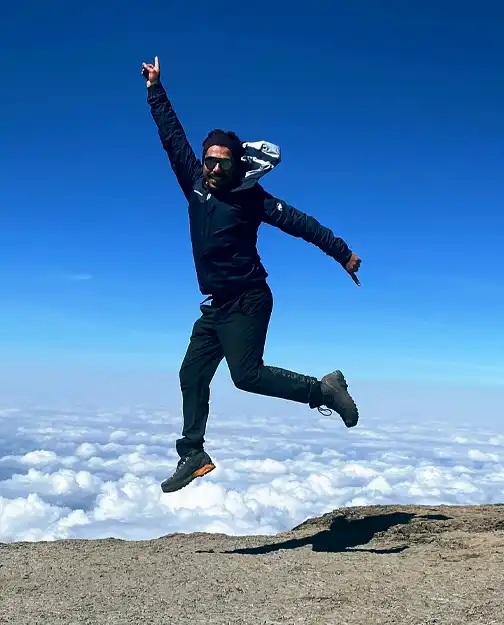
Why Trekking With Us?
- We have the Best Mountain Guides:
Wilderness First Responder certified guide. - We are using Quality Camping Gears:
All our gears are of International Mountain Standards. - Reasonable Price Guaranteed:
We are among the few companies providing the best price for responsible mountain climbs. - Best Services on the Mountain:
We provide the best service on the Mountain to both our travelers/climbers and our crew.
- Easy booking confirmation:
We charge only $300 per person to reserve your climb using a credit card, and the remaining balance you can pay 30 days before your arrival or by cash upon arrival. - We have the best Mountain Crew:
All our Mountain crew are trained to take good care for our clients during the climb. - All our Climbing tours are Guaranteed Departure:
Even if you are the only one have booked the climb, the tour will not be canceled.
Our Traveler’s Feedback
What Our Happy Clients Say About us

